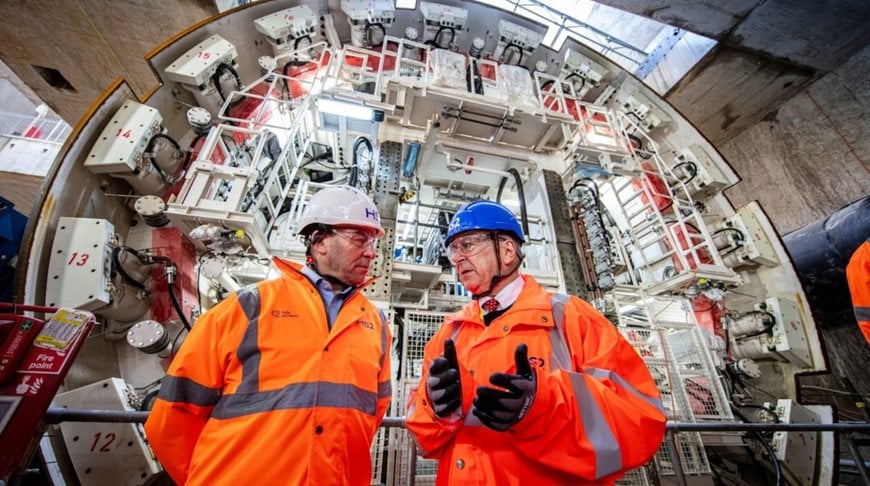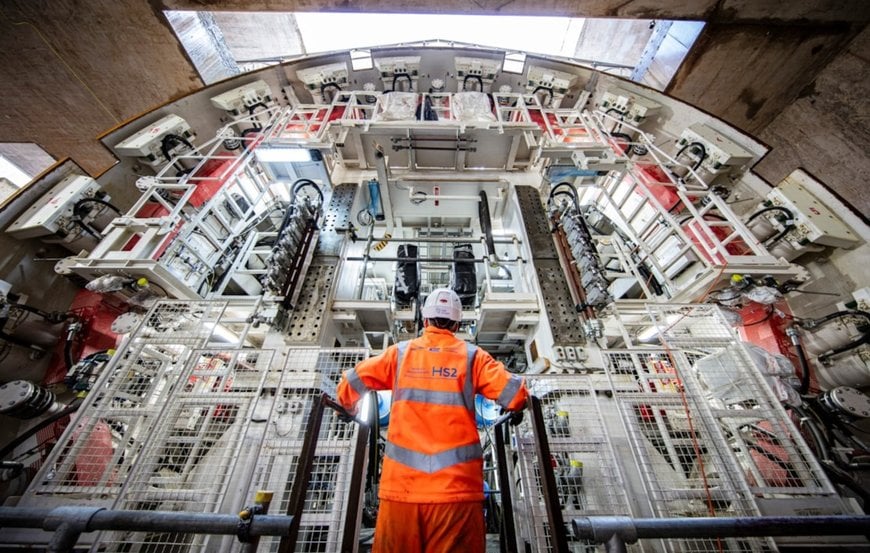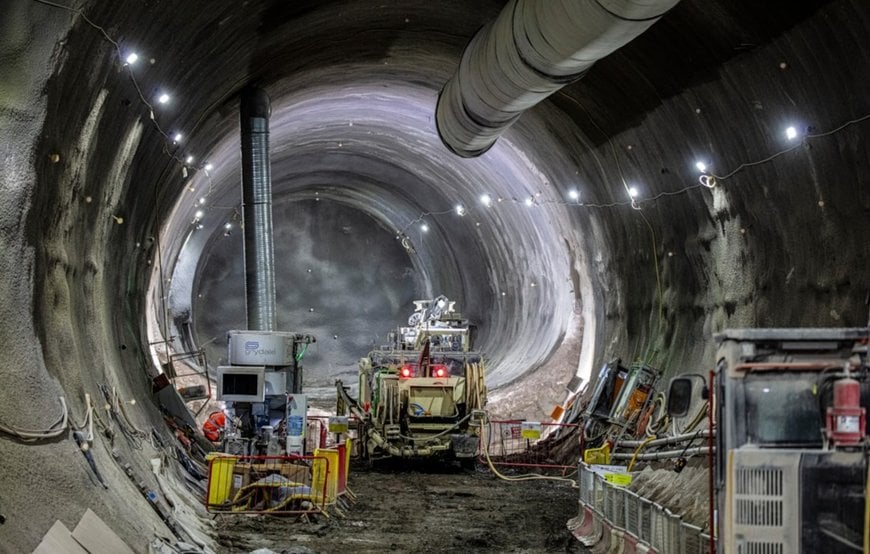railway-international.com
03
'24
Written on Modified on
HS2 reveals giant tunnelling machines ready for 4.5-mile drive into the heart of London
Two giant tunnelling machines, named Karen & Madeleine after prominent figures in rail and engineering, to dig the final 4.5 miles of underground high-speed railway & carry HS2 trains to Euston.

Rail Minister, Lord Peter Hendy, and new HS2 CEO Mark Wild at Old Oak Common East box where the Euston TBMs are being prepared
Engineers have begun assembling two giant tunnelling machines that will dig the final 4.5 miles of underground high-speed railway – carrying HS2 trains into the heart of London.
Weighing an incredible 1,250 tonnes, each of the tunnel boring machines (TBMs) will launch from an underground box at one end of the project’s Old Oak Common station. They are expected to take around one and a half years to reach the railway’s final southern terminus at London Euston.
As well as taking passengers closer to central London, the extension to Euston will create additional capacity on the new high-speed line, allowing more services to run to more destinations across the Midlands and the North.
Arrival of the line into Euston is also expected to trigger a transport-led regeneration of the area – unlocking opportunities for thousands of new homes and jobs.

TBM Karen being assembled in the Old Oak Common station box
In keeping with tradition, the TBMs have been given female names after prominent women in history. One machine is called Karen after Karen Harrison, the first female train driver in the UK who was based out of Old Oak Common depot. The second is named Madeleine, after Madeleine Nobbs, the former president of the Women’s Engineering Society.
The unveiling of the TBMs – the final set to be launched for the railway between London and the West Midlands – marks another significant milestone for HS2.
It comes on the day that Mark Wild joins HS2 Ltd as the company’s new chief executive. Mr Wild, former CEO of Crossrail, will help oversee the project’s transition from a major construction programme to a working railway, with a renewed focus on controlling costs.
The two 190m-long TBMs were manufactured by world-leading tunnelling experts Herrenknecht AG in Germany and were transported to Old Oak Common in pieces before being reassembled on site. This summer, the HS2 team lifted the machines into the underground station box using a 750-tonne crane. They are now being reassembled at the eastern end of the station, ready to bore to Euston.
The cutterhead of the machine, which has been optimised to cut through London clay, is 8.53m across with the inner diameter of the tunnel set to be 7.55m.

Sprayed concrete lined tunnel from where Euston TBM Karen will launch to construct HS2's Euston Tunnel
The TBMs are like underground factories, excavating the tunnels using a turning cutterhead, lining them with pre-cast concrete tunnel segments, grouting them into place before moving forward at an average speed of 16 metres per day. Teams work around the clock below ground on the along with teams on the surface supporting them.
HS2’s London tunnels contractor, Skanksa Costain STRABAG (SCS) joint venture, is leading construction of the twin-bored tunnel. In January 2024 the team completed a logistics tunnel from a nearby site at Atlas Road which will provide access for materials, and a route to remove the London Clay being excavated by the machine. It has also built two spray concrete-lined tunnels from which the TBMs will be launched eastwards towards Euston. Boring is expected to begin in 2025.
SCS is already well advanced with construction the Northolt tunnel – a separate structure running west out of Old Oak Common towards West Ruislip, outer London.
The machines will complete their journeys underground and the outer can of the machine will be left to form part of the tunnel. The mechanical components of the TBMs will be pulled back through the 4.5 mile tunnel and disassembled.
The approach to Euston will be completed by spray concrete lined tunnels which will then transition into three tunnels, which will enable trains to be fed into and from platforms at Euston station.
Final plans for the future HS2 terminus station at Euston are still under review and HS2 Ltd is continuing to work with the Government and other stakeholders to design an affordable station design that can run HS2 services from London to the Midlands. Further details will be announced by the Government in due course.
Naming HS2’s final tunnelling machines
The two new TBMs will become the ninth and 10th used for excavation of HS2's deep bored sections of the 140-mile route between London and the West Midlands.
Karen is named after Karen Harrison, the first female train driver in the UK. Karen, who lived between 1960 and 2011, drove trains out of the Old Oak Common depot, on the site of HS2’s new superhub station, in the 1970s.
The second machine is named after Madeleine Nobbs, the former president of the Women’s Engineering Society. She lived from 1914 to 1970 and worked as a building services engineer.
Her father dissuaded her from pursuing a career in engineering, but after her mother met Adria Buchanan, the first woman to become a member of the Institute of Heating and Ventilating Engineers, she told her husband he could no longer refuse to support his daughter in her ambition.
www.hs2.org.uk
Engineers have begun assembling two giant tunnelling machines that will dig the final 4.5 miles of underground high-speed railway – carrying HS2 trains into the heart of London.
Weighing an incredible 1,250 tonnes, each of the tunnel boring machines (TBMs) will launch from an underground box at one end of the project’s Old Oak Common station. They are expected to take around one and a half years to reach the railway’s final southern terminus at London Euston.
As well as taking passengers closer to central London, the extension to Euston will create additional capacity on the new high-speed line, allowing more services to run to more destinations across the Midlands and the North.
Arrival of the line into Euston is also expected to trigger a transport-led regeneration of the area – unlocking opportunities for thousands of new homes and jobs.

TBM Karen being assembled in the Old Oak Common station box
In keeping with tradition, the TBMs have been given female names after prominent women in history. One machine is called Karen after Karen Harrison, the first female train driver in the UK who was based out of Old Oak Common depot. The second is named Madeleine, after Madeleine Nobbs, the former president of the Women’s Engineering Society.
The unveiling of the TBMs – the final set to be launched for the railway between London and the West Midlands – marks another significant milestone for HS2.
It comes on the day that Mark Wild joins HS2 Ltd as the company’s new chief executive. Mr Wild, former CEO of Crossrail, will help oversee the project’s transition from a major construction programme to a working railway, with a renewed focus on controlling costs.
The two 190m-long TBMs were manufactured by world-leading tunnelling experts Herrenknecht AG in Germany and were transported to Old Oak Common in pieces before being reassembled on site. This summer, the HS2 team lifted the machines into the underground station box using a 750-tonne crane. They are now being reassembled at the eastern end of the station, ready to bore to Euston.
The cutterhead of the machine, which has been optimised to cut through London clay, is 8.53m across with the inner diameter of the tunnel set to be 7.55m.

Sprayed concrete lined tunnel from where Euston TBM Karen will launch to construct HS2's Euston Tunnel
The TBMs are like underground factories, excavating the tunnels using a turning cutterhead, lining them with pre-cast concrete tunnel segments, grouting them into place before moving forward at an average speed of 16 metres per day. Teams work around the clock below ground on the along with teams on the surface supporting them.
HS2’s London tunnels contractor, Skanksa Costain STRABAG (SCS) joint venture, is leading construction of the twin-bored tunnel. In January 2024 the team completed a logistics tunnel from a nearby site at Atlas Road which will provide access for materials, and a route to remove the London Clay being excavated by the machine. It has also built two spray concrete-lined tunnels from which the TBMs will be launched eastwards towards Euston. Boring is expected to begin in 2025.
SCS is already well advanced with construction the Northolt tunnel – a separate structure running west out of Old Oak Common towards West Ruislip, outer London.
The machines will complete their journeys underground and the outer can of the machine will be left to form part of the tunnel. The mechanical components of the TBMs will be pulled back through the 4.5 mile tunnel and disassembled.
The approach to Euston will be completed by spray concrete lined tunnels which will then transition into three tunnels, which will enable trains to be fed into and from platforms at Euston station.
Final plans for the future HS2 terminus station at Euston are still under review and HS2 Ltd is continuing to work with the Government and other stakeholders to design an affordable station design that can run HS2 services from London to the Midlands. Further details will be announced by the Government in due course.
Naming HS2’s final tunnelling machines
The two new TBMs will become the ninth and 10th used for excavation of HS2's deep bored sections of the 140-mile route between London and the West Midlands.
Karen is named after Karen Harrison, the first female train driver in the UK. Karen, who lived between 1960 and 2011, drove trains out of the Old Oak Common depot, on the site of HS2’s new superhub station, in the 1970s.
The second machine is named after Madeleine Nobbs, the former president of the Women’s Engineering Society. She lived from 1914 to 1970 and worked as a building services engineer.
Her father dissuaded her from pursuing a career in engineering, but after her mother met Adria Buchanan, the first woman to become a member of the Institute of Heating and Ventilating Engineers, she told her husband he could no longer refuse to support his daughter in her ambition.
www.hs2.org.uk

